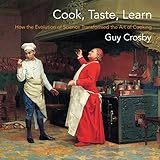Cook, Taste, Learn : How the Evolution of Science Transformed the Art of Cooking / Guy Crosby.
Material type: TextSeries: Arts and Traditions of the Table: Perspectives on Culinary HistoryPublisher: New York, NY : Columbia University Press, [2019]Copyright date: ©2020Description: 1 online resource : 39 illustrationsContent type:
TextSeries: Arts and Traditions of the Table: Perspectives on Culinary HistoryPublisher: New York, NY : Columbia University Press, [2019]Copyright date: ©2020Description: 1 online resource : 39 illustrationsContent type: - 9780231192927
- 9780231550055
- 641.01/3 23
- TX645 .C76 2020
- online - DeGruyter
| Item type | Current library | Call number | URL | Status | Notes | Barcode | |
|---|---|---|---|---|---|---|---|
 eBook
eBook
|
Biblioteca "Angelicum" Pont. Univ. S.Tommaso d'Aquino Nuvola online | online - DeGruyter (Browse shelf(Opens below)) | Online access | Not for loan (Accesso limitato) | Accesso per gli utenti autorizzati / Access for authorized users | (dgr)9780231550055 |
Browsing Biblioteca "Angelicum" Pont. Univ. S.Tommaso d'Aquino shelves, Shelving location: Nuvola online Close shelf browser (Hides shelf browser)

|

|

|

|

|

|

|
||
| online - DeGruyter Why Chimpanzees Can't Learn Language and Only Humans Can / | online - DeGruyter The Perils of the One / | online - DeGruyter Time and the Generations : Population Ethics for a Diminishing Planet / | online - DeGruyter Cook, Taste, Learn : How the Evolution of Science Transformed the Art of Cooking / | online - DeGruyter The Habermas-Luhmann Debate / | online - DeGruyter Female Fighters : Why Rebel Groups Recruit Women for War / | online - DeGruyter Play Time : Jacques Tati and Comedic Modernism / |
Frontmatter -- Contents -- Preface -- Acknowledgments -- 1 The Evolution of Cooking (2 Million–12,000 Years Ago) -- 2 The Dawn of Agriculture Revolutionizes Cooking (12,000 Years Ago–1499) -- 3 Early Science Inspires Creativity in Cooking (1500–1799) -- 4 The Art of Cooking Embraces the Science of Atoms (1800–1900) -- 5 Modern Science Transforms the Art of Cooking (1901–Present) -- 6 Cooking Science Catches Fire! -- 7 The Good, the Bad, and the Future of Cooking Science -- Bibliography -- Index
restricted access online access with authorization star
http://purl.org/coar/access_right/c_16ec
Cooking food is one of the activities that makes humanity unique. It’s not just about what tastes good: advances in cooking technology have been a constant part of our progress, from the ability to control fire to the emergence of agriculture to modern science’s understanding of what happens at a molecular level when we apply heat to food. Mastering new ways of feeding ourselves has resulted in leaps in longevity and explosions in population—and the potential of cooking science is still largely untapped.In Cook, Taste, Learn, the food scientist and best-selling author Guy Crosby offers a lively tour of the history and science behind the art of cooking, with a focus on achieving a healthy daily diet. He traces the evolution of cooking from its earliest origins, recounting the innovations that have unraveled the mysteries of health and taste. Crosby explains why both home cooks and professional chefs should learn how to apply cooking science, arguing that we can improve the nutritional quality and gastronomic delight of everyday eating. Science-driven changes in the way we cook can help reduce the risk of developing chronic diseases and enhance our quality of life. The book features accessible explanations of complex topics as well as a selection of recipes that illustrate scientific principles. Cook, Taste, Learn reveals the possibilities for transforming cooking from a craft into the perfect blend of art and science.
Mode of access: Internet via World Wide Web.
In English.
Description based on online resource; title from PDF title page (publisher's Web site, viewed 26. Apr 2024)


